I started off this post with the intention to answer all 15 questions in a single post. However, I soon realized that to answer all 15 questions in the manner I wanted to (i.e., relatively detailed, informational, etc.), I would need to write a long damn post; and I know from past experience, the Internet’s attention span is quite short. So, I decided to split the post up into 3 parts, each dealing with a set of 5 questions from Creation Ministries International’s list of “15 Questions for Evolutionists” (or, as Conservapedia calls them, “15 Questions Evolutionists Cannot Satisfactorily Answer”). I’m calling this mini-series “Arguments From Ignorance” because, well, that’s basically what these questions are (also, it goes really well with my blog title). They are all aimed at getting the “evolutionist” they are questioning to admit that they don’t know the answer to a particular question, so that they can then jump on that lack of knowledge and say that, obviously, since the “evolutionist” doesn’t know the answer, god must have done it. And, of course, as anyone with even a basic understanding of philosophy and/or logic can tell you, this is an extremely flawed method of argumentation (see: Argument from Ignorance).
This list has made the rounds in both the atheist and creationist communities; the latter, because they think it’s a trump card that kills evolution, and the former, because they are so flawed and poorly thought out that they’d just be hilarious if people didn’t actually take them seriously. Now, I’m not the first to do this, but what the hell. I need a topic for this post, and sometimes redundancy helps get through to stubborn people. So, I will do my best to answer these questions (and if someone from Conservapedia happens to pass through here, please let me know if I’ve answered them to your “satisfaction”).
1. How did life originate? Evolutionist Professor Paul Davies admitted, “Nobody knows how a mixture of lifeless chemicals spontaneously organized themselves into the first living cell.” Andrew Knoll, professor of biology, Harvard, said, “we don’t really know how life originated on this planet”. A minimal cell needs several hundred proteins. Even if every atom in the universe were an experiment with all the correct amino acids present for every possible molecular vibration in the supposed evolutionary age of the universe, not even one average-sized functional protein would form. So how did life with hundreds of proteins originate just by chemistry without intelligent design?
I’m guessing they decided to start off with an easy question. Either that, or they don’t actually have any idea what the theory of evolution says (which, when you think about it, is quite plausible). The theory of evolution says absolutely nothing about the origin of life. There. Question answered, with regard to evolution. Now, as for my answer to the actual question? I don’t know how life originated, and no one is actually sure what the answer to that question really is. But evolution is not claimed to explain the origins of life; rather, it is intended to explain the diversity of life. You are assuming that, because the theory of evolution deals with biological life, it must therefore explain where biological life comes from. That’s about the same as saying that, because the theory of gravity deals with matter, it must be able to explain the origins of matter, despite the fact that the theory itself has nothing to do with the origins of matter, whatsoever.

(Those damn Gravitationalists and their lies…)
If you are looking for scientific explanations for the origins of life, I would suggest looking up scientific studies and hypotheses on abiogenesis.
2. How did the DNA code originate? The code is a sophisticated language system with letters and words where the meaning of the words is unrelated to the chemical properties of the letters—just as the information on this page is not a product of the chemical properties of the ink (or pixels on a screen). What other coding system has existed without intelligent design? How did the DNA coding system arise without it being created?
Wow. You managed to ask what is essentially the same question twice in a row. Again, the theory of evolution does not aim to explain the origins of biological life. And considering the fact that DNA is known as one of the the basic building blocks of life on Earth (and thus likely part of the origin of life), it cannot be said that evolution makes claims as to the origins of DNA. Again, please see abiogenesis.

(Redundant picture for redundant question.)
3. How could mutations—accidental copying mistakes (DNA ‘letters’ exchanged, deleted or added, genes duplicated, chromosome inversions, etc.)—create the huge volumes of information in the DNA of living things? How could such errors create 3 billion letters of DNA information to change a microbe into a microbiologist? There is information for how to make proteins but also for controlling their use—much like a cookbook contains the ingredients as well as the instructions for how and when to use them. One without the other is useless. Mutations are known for their destructive effects, including over 1,000 human diseases such as hemophilia. Rarely are they even helpful. But how can scrambling existing DNA information create a new biochemical pathway or nano-machines with many components, to make ‘goo-to-you’ evolution possible? E.g., How did a 32-component rotary motor like ATP synthase (which produces the energy currency, ATP, for all life), or robots like kinesin (a ‘postman’ delivering parcels inside cells) originate?
Short answer: they didn’t. Mutations are not considered to be the driving force behind evolutionary processes. They are a potential evolutionary factor, yes, but mutations are generally not assumed to be the main cause of evolutionary change. Also, mutations don’t “create” information; nor do any other evolutionary mechanisms. The change from “microbe to microbiologist”? There is likely more genetic information involved in the microbe’s genome than in the microbiologist’s. The microbe Polychaos dubium (formerly Amoeba dubia) actually has the largest genome of any known organism. So any mutation is actually working with pre-existing genetic information. How is this possible? Well, DNA basically contains instructions on what amino acids to make, and how to use them. The “how to use them” part involves the construction of proteins, which are then used to construct “biochemical pathways”, as well as internal organs, bones, and pretty much everything else that goes into a living organism. This means that a mistake in the genetic code can cause a good number of changes, from organ development to coloration and beyond, all because the DNA tells the cells to make a sightly different amino acid.
Take, for example, one of the major differences between humans and chimpanzees: the ability to speak and create language. Chimpanzees are currently believed to be the closest living evolutionary relatives to Homo sapiens (that’d be us). So why is it that they cannot speak, while parrots can? Well, the answer is in their protein production (which is, as previously stated, dependent on genetics). Specifically, the Forkhead box protein P2 (FOXP2). Throughout the animal kingdom, FOXP2 is incredibly important for determining vocalizations. Between humans and chimpanzees, FOXP2 differs by only two amino acids. For those of you who aren’t all that well versed in genetics, that means that this could have been caused by a shift in a single DNA base pair (not saying that it did, mind you; just stating that that is a possibility).
Yes, it is true that most mutations that we regularly observe are harmful; however, we know that mutations can, at times, be beneficial. For example, take the mutation that causes sickle-cell anemia. While there are negative effects of this mutation, it is understood to have positive effects as well in Sub-Saharan Africa, where the mutation is believed to have first become prevalent. This is because it helps to prevent or minimize malarial infection in people who have the mutation. So to say that mutations could not have led to positive outcomes in evolutionary history is really quite disingenuous.
And yes, I did catch that you mentioned ATP synthase and kinesin with reference to man-made machines such as rotary motors and robots. Nice try, but self-replicating systems are not sufficiently similar to man-made processes for you to effectively draw that conclusion. Basic philosophy lesson: things must be sufficiently similar to one another for comparisons to be valid.

4. Why is natural selection, a principle recognized by creationists, taught as ‘evolution’, as if it explains the origin of the diversity of life? By definition it is a selective process (selecting from already existing information), so is not a creative process. It might explain the survival of the fittest (why certain genes benefit creatures more in certain environments), but not the arrival of the fittest (where the genes and creatures came from in the first place). The death of individuals not adapted to an environment and the survival of those that are suited does not explain the origin of the traits that make an organism adapted to an environment. E.g., how do minor back-and-forth variations in finch beaks explain the origin of beaks or finches? How does natural selection explain goo-to-you evolution?
Thank you for another easy question! I actually had to work a bit at that last one. Do research, type more than one paragraph, you know. Work. But you basically threw me a bone here. Answer #4: natural selection IS evolution! Or, more accurately, natural selection is the mechanism (or at least, one of the mechanisms) by which evolution occurs. To say that natural selection can happen, but evolution can’t (i.e., micro- vs macro-evolution) is like saying you can take a single step, but to walk a mile is impossible (yes, this comparison has been used before). Of course evolutionary theory can explain the origins of traits. The beaks? Easy. There may (emphasis on may) once have been a species of reptile that fed largely on foods with tough outer shells (e.g., nuts). The individuals which happened to have harder, tougher mouths were more capable of getting to the nutritional parts of their food supply. Thus, those with tougher mouths had greater survival rates, as they could access food resources that other individuals could not. And the trend continued; as generations passed, more and more individuals were born with tougher and tougher mouths, allowing them greater access to food resources. Eventually (many generations later) these mouths developed into what we now refer to as beaks. Now, keep in mind that this was only a hypothetical situation; I do not know for certain what exactly caused the development of beaks. But this does seem like a plausible scenario. What ID proponents miss with this question is that the only difference in the “back-and-forth variations” and evolution from species to species is the timescale over which changes are observed. Which makes creationist reasoning amount to:
5. How did new biochemical pathways, which involve multiple enzymes working together in sequence, originate? Every pathway and nano-machine requires multiple protein/enzyme components to work. How did lucky accidents create even one of the components, let alone 10 or 20 or 30 at the same time, often in a necessary programmed sequence. Evolutionary biochemist Franklin Harold wrote, “we must concede that there are presently no detailed Darwinian accounts of the evolution of any biochemical or cellular system, only a variety of wishful speculations.”
Ah, a question that the theory should legitimately be able to answer! Unfortunately, what is being asked is extremely broad, and honestly, no one is entirely certain. So, very short answer: I don’t know. Now that we’ve gotten past that little omission, I’d like to delve into the scientific speculation a bit. You see, just because I’ve admitted that I am not certain of the causes of a particular evolutionary development, does not mean that the theory is wrong; it merely means that more study is required (see again: Argument from Ignorance). And so scientists make educated guesses (called “hypotheses”), which they then attempt to test, to determine whether or not these guesses are plausible explanations for specific phenomena. And if, by chance, those studies happen to uncover information that refutes evolution, then so be it. The theory will be discarded. Unfortunately for creationists, no such evidence refuting evolution has yet been presented, and at present the theory of evolution remains the best explanation we have come up with, considering what we know about the natural world (and before anyone says anything about the Bible, a book of superstitions written by bronze age goat herders, with a bit of iron age philosophy stolen from the Greeks at the end, does not constitute scientific evidence).
Now, on to the hypotheses. First, let us understand that by “biochemical pathways”, what CMI seems to mean is the process of chemical reactions within and between cells. I say “seems to mean” because they really aren’t that clear, but they do refer to things like “enzymes”, so I would assume that they are referring to processes like glycolysis. Now, I must make this incredibly clear: I am not a chemist. I have very little background in chemistry, and as such, do not have a full understanding of the processes involved in glycolysis or any other biochemical process. But one thing I can tell you is this: each biochemical process is different, and therefore each one likely arose in a different manner, under different circumstances. A full answer to this question with regard to even a single process would require a great deal of research, which I (sadly) do not have time for at present. Just as an example though, I will point you to a paper on the possible evolutionary origins of glycolysis and a video from a man with a mustache. The best simple explanation I can give is that glycolysis developed as a method of energy production in an anaerobic (i.e., oxygen deficient) environment, in cells which lacked organelles. That is, it evolved as a method of energy production in the earliest known cells. Now, how did this occur? Well, we don’t have specifics. And this is true for many biochemical processes. The development of such processes occurred billions of years ago. We do not yet have the ability to gather hard data on the subject. And that is what CMI is attempting to use as evidence against evolution: because “evolutionists” do not claim to have all the answers, while their little book does claim such absolute knowledge, their book must be correct. Unfortunately, such intellectual stagnation does not equate to knowledge.
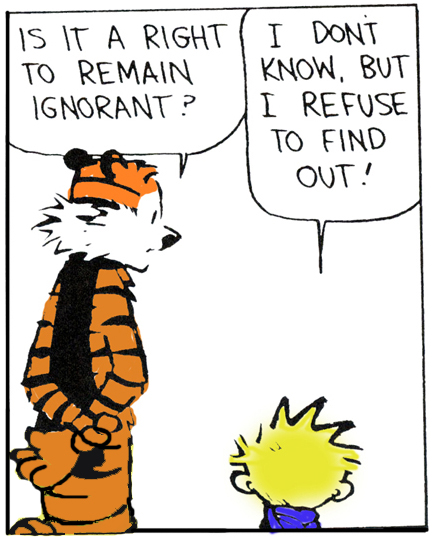
(Not that they care.)
Thanks for reading. Part 2 is coming soon. Hopefully it’ll be up by tonight, but I’m not making any promises.

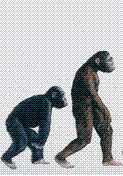
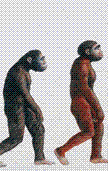
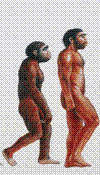
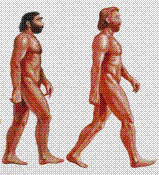
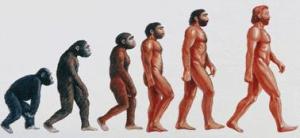
[…] to answer Creation Ministries International’s “15 Questions for Evolutionists” (Part 1 is here). In the last post, I dealt with questions 1 through 5, and for this I intend to deal with 6 […]
[…] of a Google search shows it’s been answered here, here, here, here, here, here, here, here and here, among […]